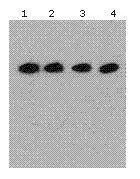
Western Blot analysis of 293 cells transfected with DYKDDDK-tagged vectors at different concentration(0.5mg/ml), Lane 4:lowest concentration(0.1ug/ml)
DDDDK tag antibody [F.G2]
GTX80656
ApplicationsImmunoFluorescence, ImmunoPrecipitation, Western Blot, ImmunoCytoChemistry
Product group Antibodies
ReactivityOther Species
Overview
- SupplierGeneTex
- Product NameDDDDK tag antibody [F.G2]
- Delivery Days Customer9
- Antibody SpecificityRecognizes over-expressed proteins containing DYKDDDDK epitope tag fused to either amino- or carboxy-termini of targeted proteins in transfected mammalian cells.
- Application Supplier NoteFor IF: Use at a dilution of 1:200. For IP: Use at a dilution of 1:200. For WB: Use at a dilution of 1:1,000. Optimal dilutions/concentrations should be determined by the researcher.
- ApplicationsImmunoFluorescence, ImmunoPrecipitation, Western Blot, ImmunoCytoChemistry
- CertificationResearch Use Only
- ClonalityMonoclonal
- Clone IDF.G2
- Concentration1 mg/ml
- ConjugateUnconjugated
- HostMouse
- IsotypeIgG2b
- Scientific DescriptionEpitope tags provide a method to localize gene products in a variety of cell types, study the topology of proteins and protein complexes, identify associated proteins, and characterize newly identified, low abundance or poorly immunogenic proteins when protein specific antibodies are not available. Tagging with xxxDDDDK may be done at the N-terminus, N-terminus preceded by a methionine residue, C-terminus, and in internal positions of the target protein. The small size of the epitope tag and its high hydrophilicity tend to decrease the possibility of interference with protein expression, proteolytic maturation, antigenicity and function. The enterokinase cleavage site allows it to be completely removed from the purified fusion proteins.
- ReactivityOther Species
- Storage Instruction-20°C or -80°C,2°C to 8°C
- UNSPSC12352203
References
- Exposure to galactic cosmic radiation compromises DNA repair and increases the potential for oncogenic chromosomal rearrangement in bronchial epithelial cells. Li Z et al., 2018 Jul 23, Sci RepRead more
- Receptor-mediated delivery of engineered nucleases for genome modification. Chen Z et al., 2013 Oct, Nucleic Acids ResRead more
- Protein kinase Cdelta regulates endothelial nitric oxide synthase expression via Akt activation and nitric oxide generation. Sud N et al., 2008 Mar, Am J Physiol Lung Cell Mol PhysiolRead more
